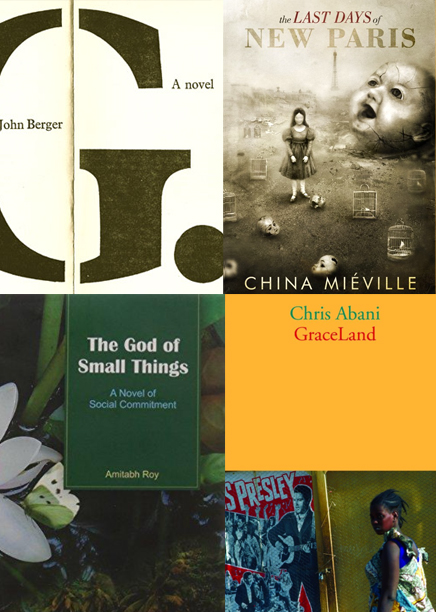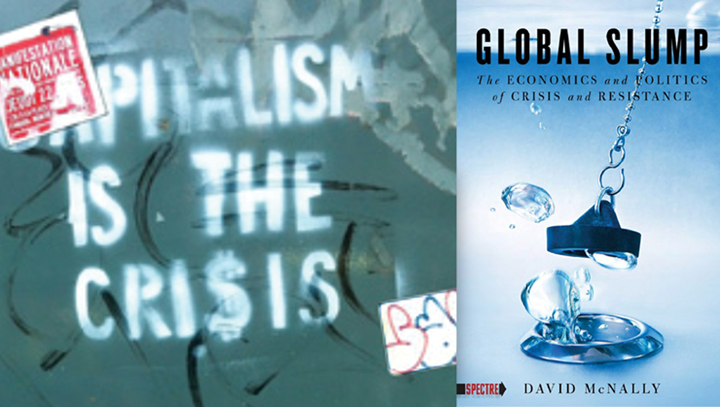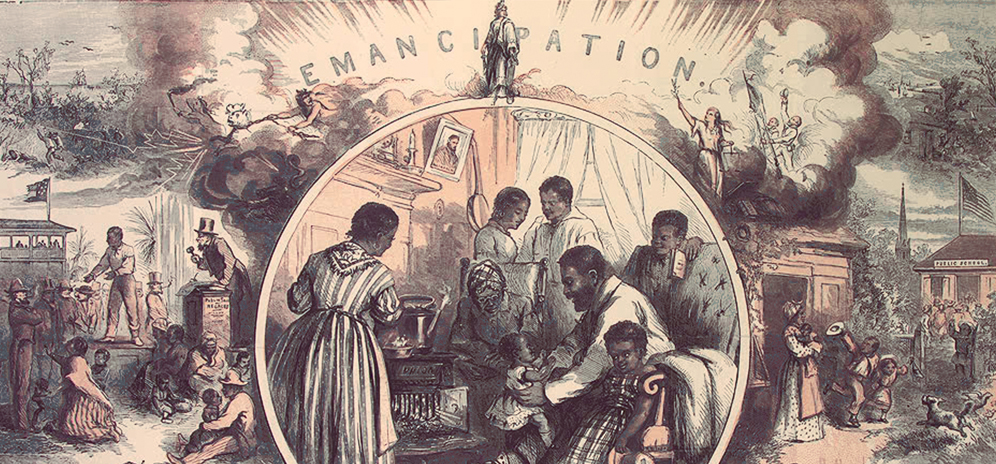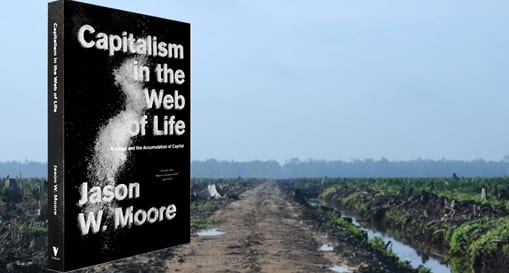A Spring Fever of World Literature
On-Line via Zoom You will receive Zoom link by email before the event., NYFour writers (John Berger, China Miéville, Arundathi Roy and Chris Abani) who have provided us with an array of work to counter the despair of late capital during this period when the scales are weighted far more towards barbarity and continual degradation of our biosphere, than towards what should be an equally shared planet by all who inhabit it. Please join us for close readings and discussions of works spanning the last century and much of the globe.
2008 Capitalist Crisis: McNally’s Global Slump
The People's Forum 320 West 37th Street, New York, NY, United StatesIt remains important for us to understand the underlying causes within this late stage of capitalist development that led to the 2008 crisis, and how the international community of capitalist interests regrouped so that we of the working classes develop our capacity to effectively take on the political, ideological and economic challenges we are facing now and in the struggles ahead for a better life for all. McNally’s Global Slump is an impressive attempt to provide such a Marxist understanding for the crisis and a good example to see the explanatory power of Marx's social theory as laid out in the three volumes of Capital.
Black Reconstruction
The People's Forum 320 West 37th Street, New York, NY, United StatesTHIS SERIES HAS BEEN EXTENDED TO MAY 20!
...the great social revolution of that momentous period following the Civil War was surely the “reconstruction” of social relations in the former slave states. In his groundbreaking study (1935), W.E.B. DuBois reveals that this social revolution was both initiated by slaves in the midst of the war and carried through by the emancipated Black population during and after the period when federal troops occupied the former Confederate states.
Ecology, Capital and History
On-Line via Zoom You will receive Zoom link by email before the event., NYJoin us for a close reading of Jason W. Moore's Capitalism in the Web of Life. Using Moore's world-ecology framework, we will rethink the history of capitalism as a dialectic in which wealth, power, and nature interact to produce recurring crises - including today's troubling nexus of global warming, mass extinction, and the exceeding of planetary boundaries.
A Spring Fever of World Literature
On-Line via Zoom You will receive Zoom link by email before the event., NYFour writers (John Berger, China Miéville, Arundathi Roy and Chris Abani) who have provided us with an array of work to counter the despair of late capital during this period when the scales are weighted far more towards barbarity and continual degradation of our biosphere, than towards what should be an equally shared planet by all who inhabit it. Please join us for close readings and discussions of works spanning the last century and much of the globe.
Use: A Users’ Manual
...we approach the various ways that “use” enters into and exercises power within our lexicon, performances, and politics. From commonplace phrases like “what’s the use?” and “make yourself useful!” to the Marx’s explication of a commodity’s use value, the language of use pops up in far flung and sometimes unexpected spheres. How do we delineate the useful and the useless, the usual and the unusual?
Black Reconstruction
The People's Forum 320 West 37th Street, New York, NY, United StatesTHIS SERIES HAS BEEN EXTENDED TO MAY 20!
...the great social revolution of that momentous period following the Civil War was surely the “reconstruction” of social relations in the former slave states. In his groundbreaking study (1935), W.E.B. DuBois reveals that this social revolution was both initiated by slaves in the midst of the war and carried through by the emancipated Black population during and after the period when federal troops occupied the former Confederate states.
Ecology, Capital and History
On-Line via Zoom You will receive Zoom link by email before the event., NYJoin us for a close reading of Jason W. Moore's Capitalism in the Web of Life. Using Moore's world-ecology framework, we will rethink the history of capitalism as a dialectic in which wealth, power, and nature interact to produce recurring crises - including today's troubling nexus of global warming, mass extinction, and the exceeding of planetary boundaries.
A Spring Fever of World Literature
On-Line via Zoom You will receive Zoom link by email before the event., NYFour writers (John Berger, China Miéville, Arundathi Roy and Chris Abani) who have provided us with an array of work to counter the despair of late capital during this period when the scales are weighted far more towards barbarity and continual degradation of our biosphere, than towards what should be an equally shared planet by all who inhabit it. Please join us for close readings and discussions of works spanning the last century and much of the globe.
Capital, Volume 2
The People's Forum 320 West 37th Street, New York, NY, United StatesHow the hell can reproduction of society as a whole take place when there is no conscious social planning that insures that all needs are met and in the necessary proportions such that a continuous reproduction of the conditions of life can take place and reproduce the capitalist relations of production? By looking at capitalist social reproduction from this viewpoint, in Volume II we discover the solution to this problem while new internal contradictions and instabilities at a societal level inherent to this mode of production are explained.
Black Reconstruction
The People's Forum 320 West 37th Street, New York, NY, United StatesTHIS SERIES HAS BEEN EXTENDED TO MAY 20!
...the great social revolution of that momentous period following the Civil War was surely the “reconstruction” of social relations in the former slave states. In his groundbreaking study (1935), W.E.B. DuBois reveals that this social revolution was both initiated by slaves in the midst of the war and carried through by the emancipated Black population during and after the period when federal troops occupied the former Confederate states.
Ecology, Capital and History
On-Line via Zoom You will receive Zoom link by email before the event., NYJoin us for a close reading of Jason W. Moore's Capitalism in the Web of Life. Using Moore's world-ecology framework, we will rethink the history of capitalism as a dialectic in which wealth, power, and nature interact to produce recurring crises - including today's troubling nexus of global warming, mass extinction, and the exceeding of planetary boundaries.
A Spring Fever of World Literature
On-Line via Zoom You will receive Zoom link by email before the event., NYFour writers (John Berger, China Miéville, Arundathi Roy and Chris Abani) who have provided us with an array of work to counter the despair of late capital during this period when the scales are weighted far more towards barbarity and continual degradation of our biosphere, than towards what should be an equally shared planet by all who inhabit it. Please join us for close readings and discussions of works spanning the last century and much of the globe.
Capital, Volume 2
The People's Forum 320 West 37th Street, New York, NY, United StatesHow the hell can reproduction of society as a whole take place when there is no conscious social planning that insures that all needs are met and in the necessary proportions such that a continuous reproduction of the conditions of life can take place and reproduce the capitalist relations of production? By looking at capitalist social reproduction from this viewpoint, in Volume II we discover the solution to this problem while new internal contradictions and instabilities at a societal level inherent to this mode of production are explained.
A Spring Fever of World Literature
On-Line via Zoom You will receive Zoom link by email before the event., NYFour writers (John Berger, China Miéville, Arundathi Roy and Chris Abani) who have provided us with an array of work to counter the despair of late capital during this period when the scales are weighted far more towards barbarity and continual degradation of our biosphere, than towards what should be an equally shared planet by all who inhabit it. Please join us for close readings and discussions of works spanning the last century and much of the globe.






